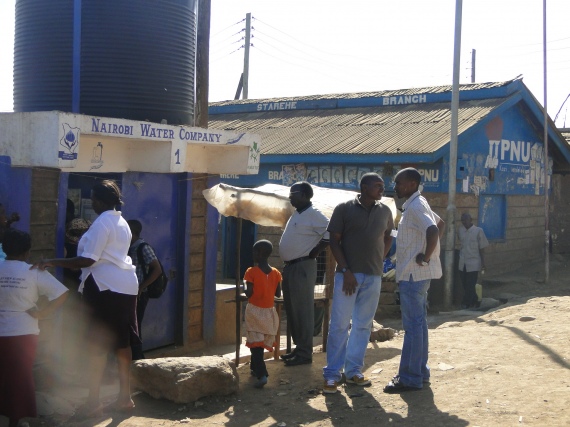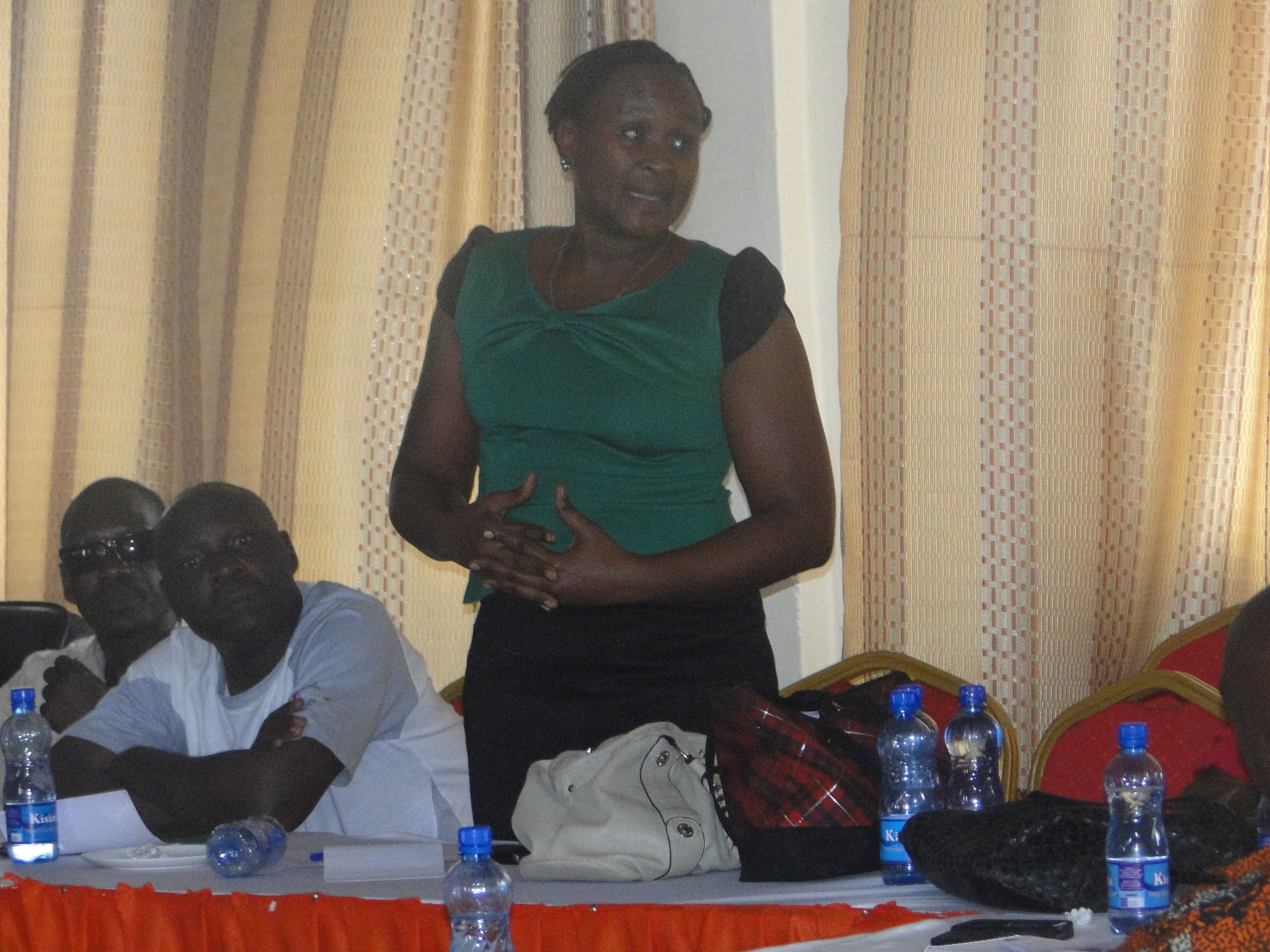The function of coproduction: strengthening relationships between slum dwellers and local governments
By Shadrack Mbaka, Sophia Khamis and Eva Muchiri
Kosovo Water Kiosk constructed between the Mathare Kosovo Community and the Nairobi Water and Sewerage Company
In the informal settlements across the East African region, basic infrastructure provision remains a major issue. Urban poor federations within the Slum Dwellers International Network(SDI), have in the last two years engaged in detailed data collection at city wide level and settlement community priorities is largely pegged on infrastructure and tenure provision. Based on data available on the SDI Know Your City web platform (ONA), collectively Kenya, Uganda and Tanzania have successfully profiled 609 settlements, mapped 639 settlement boundary maps and more than 1,043 services.
There may exist diverse opinions and disjointed voices as to whether our local governments have a similar community collected baseline data in their custody, so as to aide in service delivery of services among communities in the third sector-urban poor communities. Generally speaking, local governments have the capacity to provide basic infrastructure, such as tenure regularization, housing upgrading, laying water pipes or paving roads. In the current rapid world that we live in, it is only possible to tailor make a people’s solution to provide infrastructure through a "co-production" mechanism.
This discussion on the need to strengthen relationships between urban local communities and local government informed the theme of the 16th East African Hub held in Nakuru, Kenya between the 10th and 14th February 2016.The Theme of the hub was, “Strengthening co-production between local communities and their governments”. The hub brought together more than 60 delegates from the Kenyan, Tanzanian and Ugandan urban poor federations and local government officials.
As observed in developing countries, Governance, policy and city planning often take the top-down approach, rather than the popular bottom-up approach which in most cases are negotiated and agreed upon between communities and their city authorities compared to the first approach which advocates for the school of thought where decision making is triggered at the top echelons of government and just like the domino effect , trickle down through the different classes of our populations of which the lowest rungs of society – would be slum dwellers. With scarce resources and fewer strategies to mitigate the situation, slum settlements have been growing at an alarming rate in cities around East Africa.
Slum upgrading initiatives within the urban space have either taken one of two routes: either leaving the responsibility of slum upgrading and service provision in the hands of the government in the hopes that top officials will take active measures to meet the needs of the poor; or, putting the responsibility of upgrading on the shoulders of slum dwellers themselves, in an attempt to shadow slum dwellers, who end up relying on self-help.
However, there is a third option: co-production. Often used as a strategy in service provision, co-production draws from the concepts of self-help, data collection and documentation, collaboration and participation, where urban poor communities and the local government can work together to produce more effective solutions to service provision.
Delving deeper into the conversation on the need for service provision in informal settlements across the region, Joseph Muturi, a leader of the Kenyan federation and a member of the SDI Management committee, argues that co-production remains a larger than life opportunity for urban poor communities in the East African hub to engage with the state to influence policy change, reform practices and encourage governments to invest in their local communities.
Joseph Muturi, Muungano
"What I need to reiterate during this four day forum is, we slum dwellers continue haunt ourselves. As SDI affiliates we have spent so much resources in collecting city wide data, that remains unmatched by government data and yet our inability to deal with the substantive form of inequality in the city means that we are not yet ready as urban poor communities, organized in our settlements to deal with problems like informality. We therefore need to sit and have candid discussions with our city governments on how best using our data be able to co-invest in transformative community projects.”
Angella Neumbe, a local government official from Mbale Municipal council in Uganda puts the challenge of co-production into perspective. “ Governments may work differently in the implementation of slum upgrading projects where it seems as presented in the hub, that communities, local governments and other stakeholders choose to work in isolation from one another – or in some sort of semi-partnership with collaborators than as a whole collective of key actors– co-production serves as a possible strategy that both local governments and urban poor communities can adopt to engage the other in a collaborative partnership that produces process oriented goals that meet key objectives key to both slum dweller federations, partners and local governments alike.
Angella Neumbe, Mbale Municipal Council
Looking at this strategy in the context of Kenya (Kiambu), co-production can meet the direct needs of Kiandutu – addressing issues in security of tenure, water and sanitation, for a start – where approaches utilize the expertise of Kiandutu residents while drawing from the technical skills and political power of government officials and professionals in order to create a more inclusive and sustainable land sharing and sanitation and water system models.
Working alongside the county government of government and other key stakeholders provides an opportunity for Muungano to become partners to the state rather than obstacles, bridging the gap between the formal and informal.
However, in a deep discussion in the floor of the hub, members indeed agreed that there are clear obstacles to this realization: land, for instance. Firmly built on private and public lands, The Ugandan and Tanzanian federations are greatly faced with the obstacle of lack of land tenure and, thus few sustainable opportunities to low cost housing upgrading options.
Some of the delegates at the #EastAfricanHub16
This brings up a series of questions worth exploring: Will this reality hinder the possibility of co-production between federations and the local governments? How can co-production serve as a strategy to strengthen the government’s capacity to meet the needs of slum dweller communities while protecting and supporting communities? Can co-production serve to build the capacity of governments as they attempt to meet the needs of the poor?
To this day, co-production has been applied with different levels of successes in the three East African hub member countries; much of which anchors on the power relations at play. In some learning cases, co-production has been used as a tool by those in power to exploit federations, asking them to volunteer their time in the sustainability of community projects for no real reward or positive outcome. These scenarios fit within the self-exploitation critiques of participatory development, which hold that the language of "empowerment" and "participation" are a disguise for perpetuating unequal power relations. In other cases, co-production has been much more successful more so in Uganda, that has allowed the National Federation of the Urban Poor in Uganda, government and support technical organisations in the urban space to work as partners for mutual delivery of community processes and projects.
As we look closer at the context of the East African Hub, it is essential for the slum dweller federations to continue to question various strategies that allow for collaborative and sustainable initiatives to upgrading while initiating change in practice, policy and governance that leads to a more inclusive cities.




